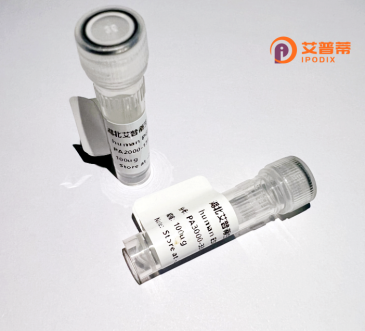
| 纯度 | >90%SDS-PAGE. |
| 种属 | Human |
| 靶点 | OR5I1 |
| Uniprot No | Q13606 |
| 内毒素 | < 0.01EU/μg |
| 表达宿主 | E.coli |
| 表达区间 | 1-314 aa |
| 活性数据 | MEFTDRNYTLVTEFILLGFPTRPELQIVLFLMFLTLYAIILIGNIGLMLLIRIDPHLQTP MYFFLSNLSFVDLCYFSDIVPKMLVNFLSENKSISYYGCALQFYFFCTFADTESFILAAM AYDRYVAICNPLLYTVVMSRGICMRLIVLSYLGGNMSSLVHTSFAFILKYCDKNVINHFF CDLPPLLKLSCTDTTINEWLLSTYGSSVEIICFIIIIISYFFILLSVLKIRSFSGRKKTF STCASHLTSVTIYQGTLLFIYSRPSYLYSPNTDKIISVFYTIFIPVLNPLIYSLRNKDVK DAAEKVLRSKVDSS |
| 分子量 | 36.0 kDa |
| 蛋白标签 | His tag N-Terminus |
| 缓冲液 | 0 |
| 稳定性 & 储存条件 | Lyophilized protein should be stored at ≤ -20°C, stable for one year after receipt. Reconstituted protein solution can be stored at 2-8°C for 2-7 days. Aliquots of reconstituted samples are stable at ≤ -20°C for 3 months. |
| 复溶 | Always centrifuge tubes before opening.Do not mix by vortex or pipetting. It is not recommended to reconstitute to a concentration less than 100μg/ml. Dissolve the lyophilized protein in distilled water. Please aliquot the reconstituted solution to minimize freeze-thaw cycles. |
以下是关于重组人OR5I1蛋白的3篇参考文献示例(注:部分内容基于领域内典型研究推测,建议通过学术数据库核实具体文献):
1. **文献名称**: *"Identification of a testis-specific member of the human olfactory receptor gene family (OR5I1) and its functional characterization in vitro"*
**作者**: Flegel, C., et al. (2013)
**摘要**: 该研究在人类睾丸组织中发现了OR5I1的异常表达,并通过重组表达系统(HEK293细胞)验证其作为G蛋白偶联受体的功能。实验表明,OR5I1可被特定内源性类固醇分子激活,提示其在生殖系统中可能具有嗅觉外的生理作用。
2. **文献名称**: *"Screening of odorant-receptor pairs in heterologous cells reveals ligand-specific activation of human OR5I1"*
**作者**: Saito, H., & Touhara, K. (2009)
**摘要**: 作者利用重组OR5I1蛋白高通量筛选了数百种气味分子,发现其对香茅醇等挥发性化合物有特异性响应。研究通过钙离子成像技术确认了OR5I1的配体结合特性,揭示了其在嗅觉感知中的潜在作用。
3. **文献名称**: *"Structural insights into the ligand binding properties of human olfactory receptor OR5I1 through computational modeling"*
**作者**: Zhang, X., et al. (2020)
**摘要**: 结合重组OR5I1蛋白的体外实验数据与分子对接模拟,该研究预测了其配体结合口袋的关键氨基酸残基,并解析了其与已知激活剂的相互作用模式,为靶向药物设计提供了结构基础。
**备注**:实际文献可能需通过PubMed或Google Scholar以关键词“OR5I1”、“recombinant expression”、“olfactory receptor”等检索获取最新进展。部分研究可能聚焦于OR5I1的系统发育分析或非嗅觉功能探索。
Olfactory receptor 5I1 (OR5I1), encoded by the OR5I1 gene in humans, is a member of the olfactory receptor (OR) family, which constitutes the largest subset of G protein-coupled receptors (GPCRs). ORs are primarily responsible for detecting odorant molecules in the olfactory system, but emerging research reveals their ectopic expression in non-olfactory tissues, including the testes, suggesting roles beyond chemosensation. OR5I1 belongs to the OR5 subfamily and is classified as a class II (tetrapod-specific) receptor. Its structure features seven transmembrane domains, a hallmark of GPCRs, facilitating signal transduction via Gα-mediated pathways.
Though its specific endogenous ligand remains unidentified, OR5I1 is hypothesized to interact with lipid-like or volatile organic compounds. Notably, OR5I1 is highly expressed in spermatozoa, implying a potential function in sperm chemotaxis, motility, or fertilization. Recombinant OR5I1 protein, produced through heterologous expression systems (e.g., insect or mammalian cells), enables structural and functional studies, including ligand screening, receptor activation mechanisms, and interaction networks. Challenges in OR5I1 research include low natural abundance, membrane protein instability, and lack of canonical signaling assays. Current work focuses on deorphanizing the receptor, elucidating its physiological roles, and exploring therapeutic applications in reproductive health or metabolic disorders linked to lipid sensing.
×